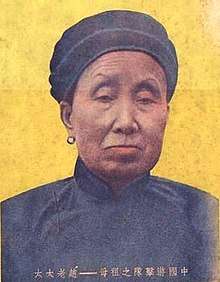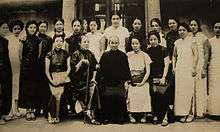Zhao Hong Wenguo
Zhao Hong Wenguo (Chinese: 趙洪文國; Wade–Giles: Chao Hung Wen-kuo; 1881–1950), known commonly as Double Gun Grandma, was a Manchu of the Bordered Yellow Banner and the Aisin-Gioro Clan[1][2], an active fighter and organizer against the Empire of Japan who helped mobilize her family of 30 people and many other Manchurians to fight against Japan in the Second Sino-Japanese War[3] in Anti-Japanese volunteer armies.
Zhao Hong Wenguo | |||||||||
|---|---|---|---|---|---|---|---|---|---|
趙洪文國 | |||||||||
 Zhao Hong Wenguo on the cover of an issue of Ta Mei Pictorial | |||||||||
| Born | Hong Wenguo 1881 | ||||||||
| Died | 1950 | ||||||||
| Nationality | Chinese | ||||||||
| Occupation | Warlord, Resistance Organizer | ||||||||
| Years active | 1931-1949 | ||||||||
| Spouse(s) | Zhao Yuhuang | ||||||||
| Children | Zhao Dong | ||||||||
| Chinese name | |||||||||
| Traditional Chinese | 趙洪文國 | ||||||||
| Simplified Chinese | 赵洪文国 | ||||||||
| |||||||||
Early life
Hong Wenguo was born in Hongqigou, Xiuyan, Fengtian Fu in 1881 to an impoverished family. She experienced the events of the First Sino-Japanese War at the age of 14. She married Zhao Yuhuang in 1898, taking his surname, and had 5 sons (one of which was Zhao Dong) and 3 daughters.[4] Through her hard work, she gained respect in her village community and improved her family’s financial situation, elevating them to a higher position[5][6]. She experienced the Russo-Japanese War at the age of 24, and the Mukden Incident at the age of 50.
Post-Mukden Incident
During the Mukden Incident, Zhao’s third son, Zhao Dong, joined the Young China Party while studying Physics at Dongbei University. After the Mukden Incident, Zhao Dong and his friends went to Beiping to set up the Northeastern Students’ Army. In 1932, Zhao Dong returned to Manchuria. In February 1934, him and his group created the China Youth Iron Blood Army, with Zhao Dong as Chief of Staff. When his friend died in July 1935, he took up the position of Commanding Officer in his stead[5][6].
Zhao Hong Wenguo was busy selling her family property in order to fund Anti-Japanese resistance efforts and training her family. She was known for her heavy discipline, and ordered her family not to be greedy, not to harm pregnant women, and not to argue and go against orders[7]. She attempted to restore her war-torn family elementary school and used Chinese language textbooks in order to prevent the spread of Japanese culture. In February 1934, the Imperial Japanese Army discovered that the Zhao family was at the root of the China Youth Iron Blood Army, promptly raiding her house and burning it down. In March, Zhao left to buy a printer, which she would later put in the elementary school and use to print Anti-Japanese propaganda. In August 1934, the IJA attacked her family again, imprisoning 300 of her family members and townspeople. Zhao refused to surrender and escaped from the IJA to Beiping, calling on the Northeast Anti-Japanese Association to assist the China Youth Iron Blood Army.
Activity in the Central Plain
By December 1935, the China Youth Iron Blood Army was expanding its influence to the Liaodong Peninsula. The group was split into 11 divisions, with 11000 people in total. They created the Liaoning Provisional Government, with Zhao Dong as President[8]. Some sources claim they participated in 300 battles of various sizes, killing 4,000, with 2,000 Japanese soldiers being killed. In May 1936, Zhao Hong Wenguo decided that she would go and help the Army, but due to the Japanese blockade, she was stopped. In the Spring of 1937, the China Youth Iron Blood Army ran into trouble, with Zhao Dong visiting his mother in Beiping to call for aid. Because of the chaos Beiping was experiencing during the Marco Polo Bridge Incident, Zhao Dong stayed, never to return to Manchuria, and instead choosing to organize uprisings in the outskirts of Beiping. On the night of July 20th, 1937, he helped start an uprising at Baiyang, Southwest of Beiping, proclaiming the North China People’s Anti-Japanese Army. Zhao Hong Wenguo helped to transport supplies to this Army, hidden in civilian clothes, as well as transporting guerilla fighters.

In September 1937, Zhao went to Wuhan to organize Anti-Japanese resistance. On her way there, in Henan, she helped two of her daughters set up an Anti-Japanese army named the Anti-Japanese Light Restoration Army, allegedly consisting of 10,000 members, which later tried to joined forces with other Anti-Japanese militias. The Light Restoration Army failed due to divisions in its upper ranks.
After Zhao left, the North China People’s Anti-Japanese Army broke into the Beiping Second Model Prison, rescued more than 1,000 prisoners, including Communists, and shot down a Japanese plane. The Army grew to a force of 25,000, with guerilla fighters stationed across Northern China. When the Communist Party of China learned about this, they sent people into the Army and gradually assimilated it into the CCP. The commander of the Eighth Route Army, Zhu De, and the deputy commander, Peng Dehuai, invited the North China People’s Anti-Japanese Army to join the Fifth Brigade of the Eighth Route Army.
References
- 邓高如; 何俊; 王犁田 (2009). 西南大剿匪纪实. 解放军出版社. p. 56. ISBN 9787506556613.
- 白希 (2006). 开国大镇反. 中共党史出版社. p. 117. ISBN 9787506556613.
- 宋斐如; 楊益群; 深圳台盟 (2006). 宋斐如文集 第一卷. 海峽學術出版社. p. 136. ISBN 9789867359346.
- 全国妇联 (1988). 《中国妇女运动史: 1919-1949》 (in Chinese). 中國: 全国妇联出版社.
- "传说中的双枪老太婆". 千龙网/21CN. Archived from the original on 2015-09-29. Retrieved 2013-08-06.
- ""中国游击队之母"赵老太太". 腾讯网. 2012-07-11. Retrieved 2013-08-12.
- 中国游击队之母”赵老太太. 腾讯网. 2012-07-11 [2013-08-12]
- 传说中的双枪老太婆. 千龙网/21CN. [2013-08-06]. (原始内容存档于2015-09-29)